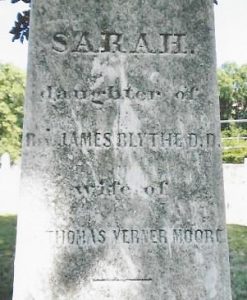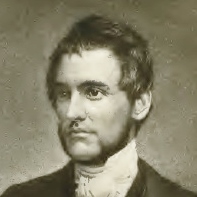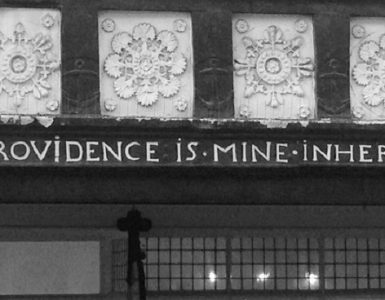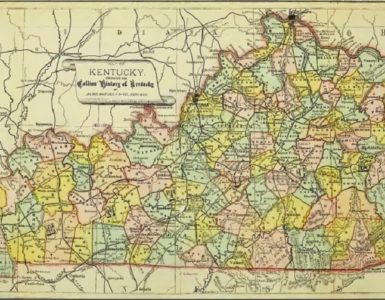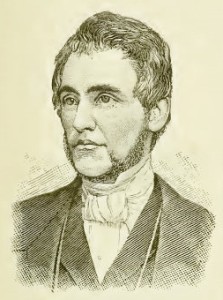 Some of the written works of ministers and theologians over the years have included poems and hymns. The nature of verse challenged them to increase their understanding of the complexities and beauties of the English language; build their general vocabularies and increase their verbal inventory of synonyms, antonyms, and homonyms; and rethink how words can be arranged and manipulated for greater consequence and beauty. Practice with English verse would have enhanced their pulpit or classroom speech while contributing to their development into more engaging communicators. Church leaders from the past that composed poetry and/or hymns, or translated them into English include— G. W. Bethune and A. R. Thompson of the Dutch Reformed Church, and Presbyterians H. A. Boardman, B. B. Warfield, Samuel Davies, J. W. Alexander, R. L. Dabney, J. A. Alexander, and as will be seen in the current post on Presbyterians of the Past, T. V. Moore. For more information on ministers and verse see B. B. Warfield’s article, “Princeton Hymns,” in the Journal of the Presbyterian Historical Society, vol. 6, no. 7, September 1912, pages 247-259.
Some of the written works of ministers and theologians over the years have included poems and hymns. The nature of verse challenged them to increase their understanding of the complexities and beauties of the English language; build their general vocabularies and increase their verbal inventory of synonyms, antonyms, and homonyms; and rethink how words can be arranged and manipulated for greater consequence and beauty. Practice with English verse would have enhanced their pulpit or classroom speech while contributing to their development into more engaging communicators. Church leaders from the past that composed poetry and/or hymns, or translated them into English include— G. W. Bethune and A. R. Thompson of the Dutch Reformed Church, and Presbyterians H. A. Boardman, B. B. Warfield, Samuel Davies, J. W. Alexander, R. L. Dabney, J. A. Alexander, and as will be seen in the current post on Presbyterians of the Past, T. V. Moore. For more information on ministers and verse see B. B. Warfield’s article, “Princeton Hymns,” in the Journal of the Presbyterian Historical Society, vol. 6, no. 7, September 1912, pages 247-259.
Thomas Verner Moore was born in Newville, Pennsylvania, February 1, 1818. His father, John, was an Irish immigrant who owned and/or operated a mill, and his mother was named Rachel, nee McCullough. He began his studies in Hanover College in Indiana, but after a year, he transferred to Dickinson College in Carlisle, Pennsylvania. He apparently met his wife, Sarah, who was the daughter of Hanover College’s president, James Blythe, during his one year of studies in Indiana. After Dickinson, he served for the American Colonization Society in Pennsylvania for about seven months before studying for the ministry in Princeton Theological Seminary. His first pastoral call was to the Second Presbyterian Church, Carlisle, after which he moved within Carlisle Presbytery to the church in nearby Greencastle. Following the resignation of William S. Plumer from First Presbyterian Church, Richmond, Virginia, Moore accepted a call to serve the congregation in 1847. Sarah died March 11, 1849. Moore then married Matilda Gwathmey, the daughter of a First Church elder, and Frank’s stepmother at the time the poem was written. After an exhausting ministry to his congregation and in the hospitals and prisons during the Civil War, he was looking to leave Richmond. When he was elected moderator of the PCUS General Assembly during its sessions in Nashville in 1867, he visited First Church and led worship. He was quickly offered a call, accepted it, and left for Nashville early the next year. Rev. Thomas Verner Moore, D.D., concluded his life of ministry when he passed away August 5, 1871. His brief time in Nashville had included several months wintering in central Florida.
The poem transcribed below was composed for the third birthday of Dr. Moore’s son, Frank. It is from the Southern Literary Messenger, vol. 19, no. 9, September 1853, page 552, which is available in digital form through the Making of America website of the University of Michigan. Sarah Moore had died shortly after the delivery of Frank, whose full name was Frank Deane Moore. Frank would grow up to follow in his father’s steps as a Presbyterian minister and be the organizing pastor of Moore Memorial Church in Nashville, currently Westminster Church, where he served from 1874 to 1879. When he resigned his call, Frank continued to be a pastor until he left the ministry to practice law in New York. At some point he moved to Anderson, South Carolina, to live with or near his sister and her husband. Frank died in Anderson, March 23, 1884. He was buried in a local cemetery for about a year until his remains were reinterred in Shockoe Hill Cemetery in Richmond, Virginia. One of the two cemetery obelisks in the photograph at the end of the poem is for Sarah, and the other is for Frank and his wife, Lily, who survived him until her death on April 27, 1927.
Barry Waugh
